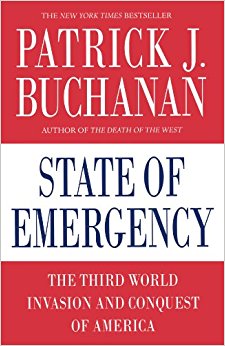Pat Buchanan’s “State of Emergency”
Tony Blankley, Creators Syndicate, August 16, 2006

On page 240 of Pat Buchanan’s stunningly logical new book, “State of Emergency: The Third World Invasion and Conquest of America” (St. Martin’s Press, New York, 2006) appear the following words:
“One of the truly major issues with which America must deal [is] the vast tidal wave of human beings coming from the Third World. There is a fragmentation going on in this country. At what point does cultural, racial diversity become a kind of social anarchy? How do you get national cohesion this way?”
But those are not the words of my friend and political sparring partner Pat Buchanan. They are words he quoted from a 1987 interview in The Christian Science Monitor with Eric Sevareid, the CBS correspondent and close associate of Walter Cronkite and Edward R. Murrow.
Only 19 years ago, one of the nation’s most respected public liberals could unself-consciously utter words that today could be a scandalous career ender for a public figure.
And it is around that issue — race, ethnicity, language, culture and immigration — and the problem of talking honestly about it, that Buchanan has constructed his most important book to date.
Most people will be familiar with Buchanan’s view on immigration. But even those who have read his earlier books and read his columns, as I have, will not be prepared for the remorseless presentation of unimpeachable facts with which he makes his convincing case for the reality of his book’s subtitle: “The Third World Invasion and Conquest of America.”
{snip}
He presents compelling evidence that the “Reconquista” of southwestern United States is not merely the silly conceit of a few extremists but is widely desired by Mexicans (he cites a 2002 Zogby poll showing that by 58 percent to 28 percent of Mexicans believe the American Southwest belongs to Mexico).
New to me was his citation to the fact that all 47 Mexican consulates in the United States are mandated to provide textbooks to U.S. schools with significant Hispanic populations, which textbooks teach history from the point of view of General Santa Ana — in which America stole the Southwest. The Los Angeles consulate, alone, has distributed 100,000 such textbooks just this year to the L.A. Unified School District.
Buchanan recounts the observation that “every great truth begins in blasphemy.” In that sense this book is one extended blasphemy against not only liberal proprieties, but even against received wisdom about the nature of America believed by many conservatives.
I have particularly in mind his chapter 9: “What Is a Nation,” in which he rejects the argument that America is fundamentally defined as a “creedal nation” of democracy, equality and the institutions formed by our constitution.
Rather, Buchanan argues, “The Constitution did not create the nation; the nation adopted the Constitution.” While the Founding Fathers did believe in universal principles and rights, “they were loyal to a particular nation and to kinfolk with whom they shared ties of blood, soil, and memory.”
{snip}
Of course, there is nothing more dangerously controversial than trying to define the ethnic, language and cultural nature and desirability of America. But until we as a country come to terms publicly with what kind of a country we think America is and should be, we can never have a rational and full debate about what kind of immigration policy we should try to enforce.
Buchanan quotes the French poet Charles Peguy: “It will never be known what acts of cowardice have been motivated by the fear of looking insufficiently progressive.”
By that standard, Buchanan, in this book, is positively fearless. He is also right. Americans, from whatever nation or ethnicity we originated, have formed a common culture worth preserving and a common history worth continuing.
{snip}















